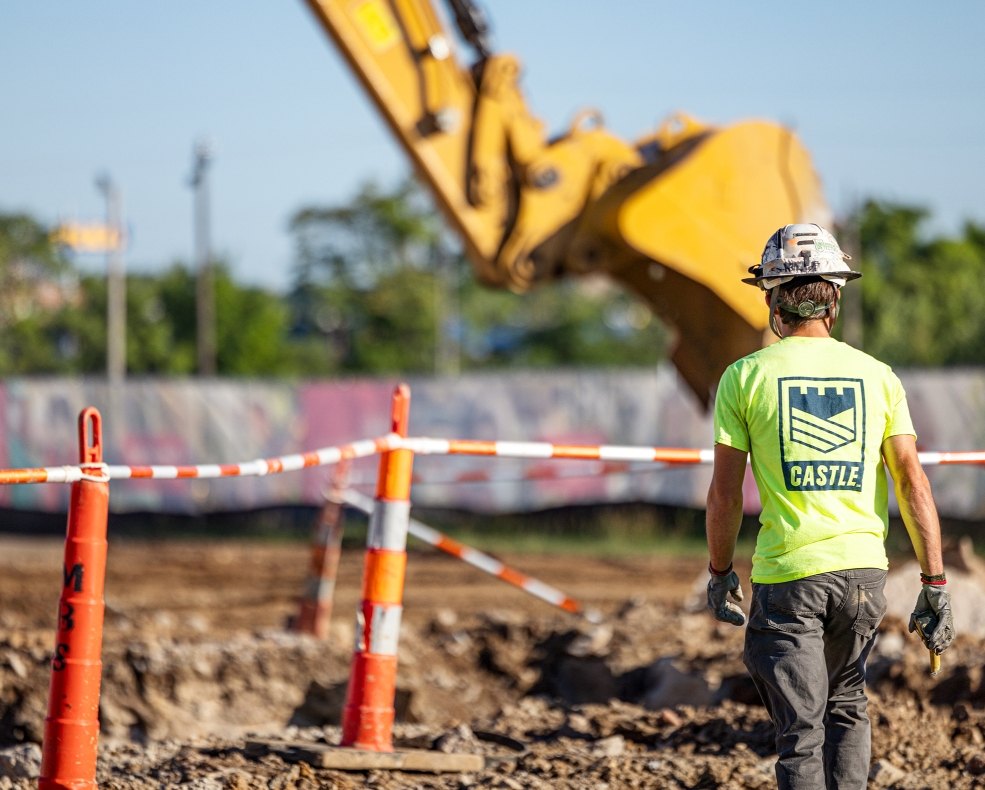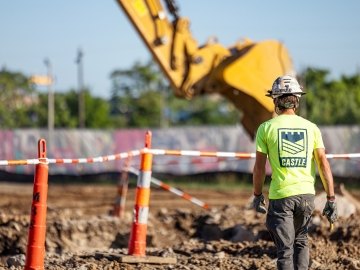10 Things You May Not Know About Civil Construction
As one of the most respected civil construction companies in the US, Castle brings decades of experience to every project.


As one of the most respected civil construction companies in the US, Castle brings decades of experience to every project. This depth of knowledge allows us to anticipate the needs of property owners and project managers, reduce costs and meet demanding deadlines. Being able to forecast challenges and answer questions is one of the benefits of working with an experienced civil construction contractor.
What are the current fill dirt prices? We hear this question all the time, and it’s often misconstrued as the most influential factor in sitework project cost. The unknown variables beneath the dirt are the riskiest components of any construction project.
To be an educated consumer, owner or project partner there are many things to understand about sitework. So, we compiled a list of the 10 that you should know before starting a civil construction project.
1. Unknowns are virtually guaranteed.
Unless you’re purchasing an open field, most sites will contain buried debris, old foundations, active or abandoned utilities, cultural artifacts or even environmental pollution. It pays to do homework and due diligence early, as the investment will be minimal compared to the costs incurred by addressing these issues later on.
2. What is a hard bid in construction? Is it the best option?
Hard bids are also known as competitive bids. Because they rely heavily on drawings or renderings, they often lack the detail or scope required to produce an accurate or informed proposal. Hard-bid contracts also open the door to numerous change orders. Subcontractors will usually bid based on the drawings they’re given even when they know their bid is based on poor drawings, there are potential site issues or the design isn’t buildable.
Castle prefers to look at the entire site to provide the best approach, achieve efficiencies, mitigate risk and delays and plan the job as part of the broader project team. The value of a design-build or construction management at risk approach is in the opportunity for early collaboration. Consider these delivery methods to gain early intelligence on your site for a well-informed budget that can capitalize on potential savings and minimize surprises. If your contracting partner is on board early, you can often make changes to the design to save time and money.
3. Jurisdictions all do their own thing.
Every municipality, city, county and state has different civil construction guidelines. Ensure your civil engineer and contractor are knowledgeable about them and incorporate that protocol when pricing your work to comply with your project. Your contractor should know how to obtain permissions and permits from the necessary boards and reviewers to expedite design changes. These processes affect planning, scheduling and production. It’s crucial for your team to know how to work with Authorities Having Jurisdiction (AHJ) for your project location to keep informed of project changes and provide seamless approvals.
4. Utilities are complex.
Utility installations and upgrades can be complicated and challenging. Utility routes can travel under or adjacent to streets, supply nearby facilities, continue through areas with high pedestrian traffic or go under major infrastructures like buildings, busy intersections and highways. Urban settings typically include an underground network of webbed utility infrastructure. If utilities are interrupted, it can be devastating to the day-to-day operations of surrounding businesses.
It’s essential to partner with a civil contractor who has the skilled crews to execute utility work and collaborate with you on design and constructability assessment. Our underground mapping service provides owners with more accurate cost expectations by informing the design of the location of existing site utilities. By identifying the most cost-effective routes for utilities, we can often save money that you can use toward other features of the project
5. Design-phase services will benefit you.
Bringing your civil contractor on board in a design-bid-build delivery method often leads to losing data and discovering conflicts in the field that increase cost and extend your schedule.
Incorporating your civil contractor early in a project can help identify challenges and conflicts during design that can be quickly addressed. Castle’s civil design-build services bring design and construction professionals together to develop the best civil solution from the beginning, working to maximize efficiencies, identify cost savings, address potential issues early, mitigate risks and incorporate solutions into the design.
6. Inefficiencies are common but not inevitable.
Coordinating work with the entire project team is essential to managing workforce and cost, and you get the most out of a plan where crews can work continuously. If you’re developing a property with multiple parcels, it can be more cost-effective to develop the overall site versus bit by bit. Coordination of shared resources across a master plan can benefit the overall development and position future projects for low risk and higher cost certainty.
7. Weather is a big deal.
Because civil contractors work exclusively outside, weather affects our work more than other construction scopes. We experienced one of the rainiest years on record in 2019, and the first quarter of 2020 had similar levels of rainfall. Knowing your civil contractor can ramp up or down and handle schedule fluctuations is essential to your project progress. The ability to mobilize equipment and the workforce based on the unexpected reduces downtime and keeps projects on schedule. Team communication is key to the success of planning for the unknown.
8. Safety is essential.
If your operator is wearing a tank top and sneakers and shows up without a hard hat, don’t hire him. He’s putting you and everyone else on-site at risk. Sitework requires a lot of heavy equipment, a high volume of hauling traffic, heavy delivery loads, open excavations and shoring. Working with a civil contractor who prioritizes a safety-first culture and prioritizes everyone’s safety is essential to a successful project.
Maintaining positive community relations by being mindful of neighbors should also be a priority. We know the importance of clean worksites and routes, visible signage, effective traffic control and communicative field teams.
9. How important are fill dirt prices?
What causes fill dirt costs to change? Project location, regional manufacturers and delivery expenses affect quality fill dirt prices. The import and export of materials can significantly affect the civil construction scope and cost. Working to balance the overall earthwork operation within the property boundaries is the first objective. Make sure there is room in your budget to account for significant import or export. By engaging Castle early, we can leverage our vast network of projects and often locate material at a reduced cost or find a home for excess materials. Timing is everything, so our ability to plan the movement of dirt is key to identifying cost-saving opportunities.
10. People make all the difference.
You need experts and skilled craft workers to deliver high-quality results.
Our field crews and operators are some of the best in the civil construction industry and enjoy solving problems and adapting to changes. Having creative design and construction minds behind your field operations is the single most valuable asset to your project.
What Do the Top Civil Construction Companies Do Differently?
Experienced civil construction companies like Castle Contracting take decades of industry experience, the latest technology and a mobile workforce to deliver projects on time. We know that collaboration, flexibility, and communication are the foundation of a successful project. Learn what makes us one of the best civil construction companies to work with. Contact us today to get started.






